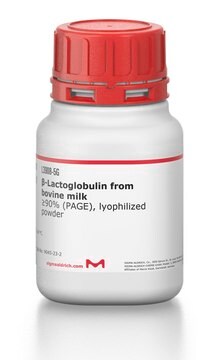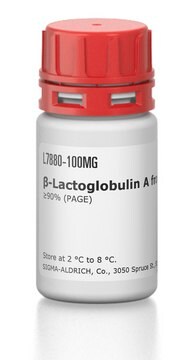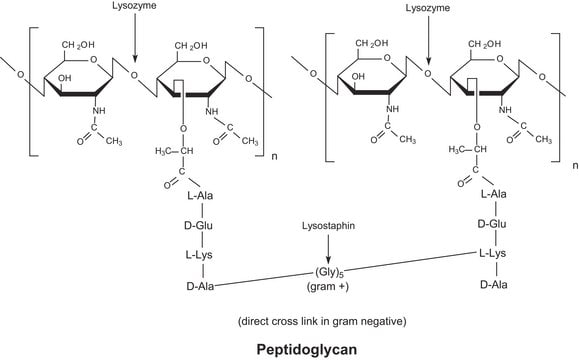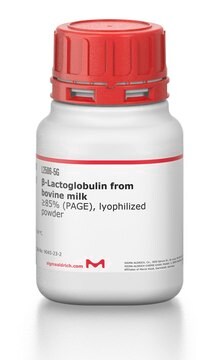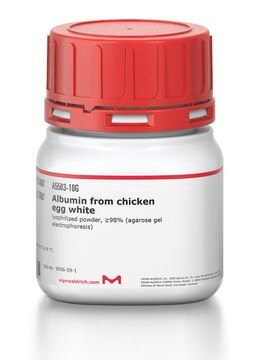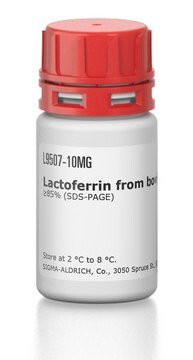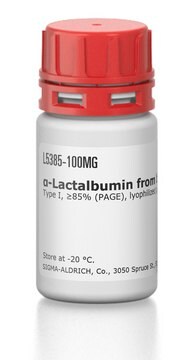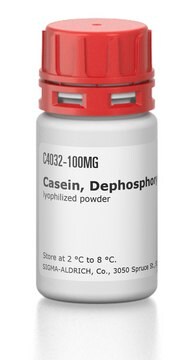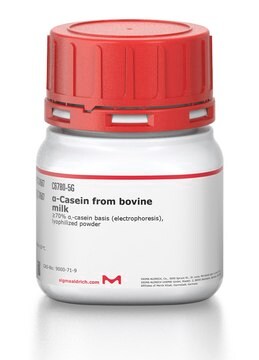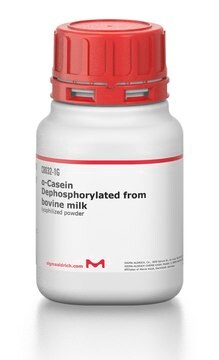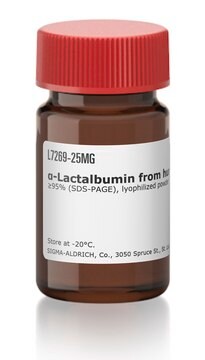L0130
β-Lactoglobulin from bovine milk
≥90% (PAGE), lyophilized powder
Sinonimo/i:
β-LG, Bos d 5, beta-LG
Autenticatiper visualizzare i prezzi riservati alla tua organizzazione & contrattuali
About This Item
Prodotti consigliati
Origine biologica
bovine milk
Livello qualitativo
Saggio
≥90% (PAGE)
Stato
lyophilized powder
N° accesso UniProt
Temperatura di conservazione
2-8°C
Informazioni sul gene
bovine ... LGB(280838)
Cerchi prodotti simili? Visita Guida al confronto tra prodotti
Descrizione generale
A member of the lipocalin family, β-Lactoglobulin (βLg) is a small protein of 162 amino acids with a molecular mass of ∼18,400 Da. It features an eight-stranded β-barrel (strands A-H) succeeded by a three-turn a-helix and a final β-strand (strand I) that forms part of the dimerization interface.
Milk from dairy cows contains the protein β-lactoglobulin (BLG). It naturally occurs in a number of genetic variants, and the most prevalent bovine variants are BLG A and BLG B.
Applicazioni
β-Lactoglobulin from bovine milk was used to test the allergen-responsive CD4+ CD25+ regulatory T cells in children who have outgrown cow′s milk allergy. It is also used to test the competitive displacement of β-lactoglobulin by Tween 20 from oil-water and air-water interfaces.
Altre note
Contains β-lactoglobulins A and B which can be isolated chromatographically.
Qualità
May not contain folate binding protein; not recommended for folate analysis.
Nota sulla preparazione
Crystallized
Codice della classe di stoccaggio
11 - Combustible Solids
Classe di pericolosità dell'acqua (WGK)
WGK 3
Punto d’infiammabilità (°F)
Not applicable
Punto d’infiammabilità (°C)
Not applicable
Dispositivi di protezione individuale
Eyeshields, Gloves, type N95 (US)
Scegli una delle versioni più recenti:
Possiedi già questo prodotto?
I documenti relativi ai prodotti acquistati recentemente sono disponibili nell’Archivio dei documenti.
I clienti hanno visto anche
Janire Orcajo et al.
Analytica chimica acta, 1052, 163-169 (2019-01-28)
Immunochemical detection of food allergens is usually based on the use of polyclonal or monoclonal immunoglobulins G (IgG) antibodies. However, due to differences in epitopes recognition between IgG and IgE, an epitope modification during food processing can potentially alter allergenicity
The Competitive Displacement of ?-Lactoglobulin by Tween 20 from Oil-Water and Air-Water Interfaces
Peter J. Wilde, David C. Clark
Journal of Colloid and Interface Science, 155, 48-54 (1993)
Unni Haddeland et al.
Pediatric allergy and immunology : official publication of the European Society of Pediatric Allergy and Immunology, 16(2), 104-112 (2005-03-25)
The hygiene hypothesis implies that the increasing prevalence of allergy in 'westernized' countries is explained by reduced bacterial exposure in early life, but the underlying mechanism remains elusive. We therefore wanted to study the effect of bacterial lipopolysaccharide (LPS) on
A Heinzmann et al.
International archives of allergy and immunology, 120(4), 280-286 (2000-01-21)
beta-Lactoglobulin (BLG) represents one of the major allergens causing cow's milk allergy (CMA) - a disease with a wide spectrum of clinical symptoms. The aim of this study was to evaluate sequential B cell epitopes of BLG by the Pin-ELISA
Kristin R Domike et al.
International journal of biological macromolecules, 44(4), 301-310 (2009-05-14)
Proteins aggregated into spherulite structures of amyloid fibrils have been observed in patients with certain brain diseases such as Alzheimer's and Parkinson's. The conditions under which these protein spherulites form and grow are not currently known. In order to illuminate
Il team dei nostri ricercatori vanta grande esperienza in tutte le aree della ricerca quali Life Science, scienza dei materiali, sintesi chimica, cromatografia, discipline analitiche, ecc..
Contatta l'Assistenza Tecnica.